Systems Engineer Resume Examples

Jul 18, 2024
|
12 min read
Build your systems engineer resume: engineering your way to success with every detail. Learn how to craft a resume that showcases your technical skills, experience, and accomplishments in a way that stands out to employers.
Rated by 348 people
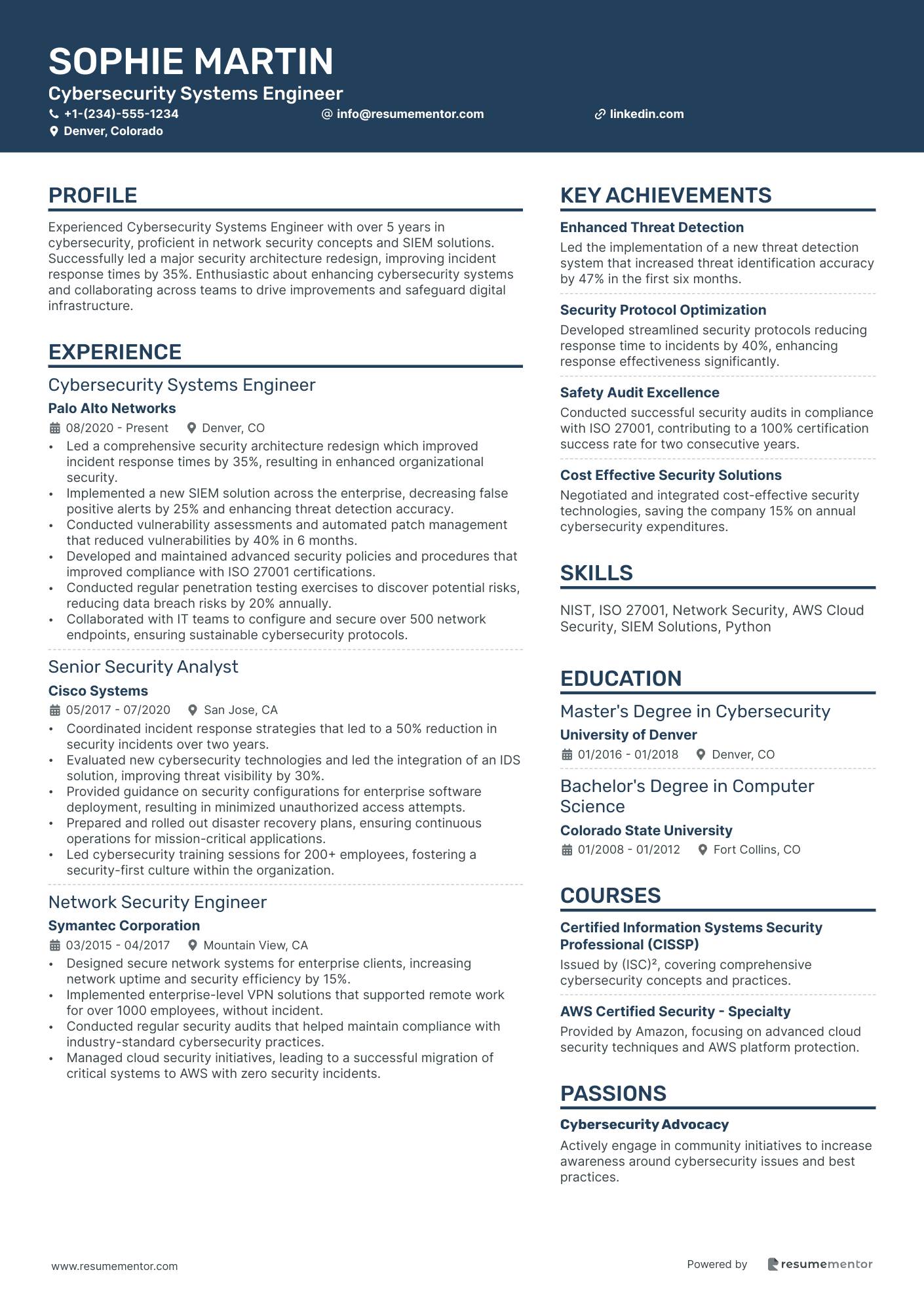
Cybersecurity Systems Engineer
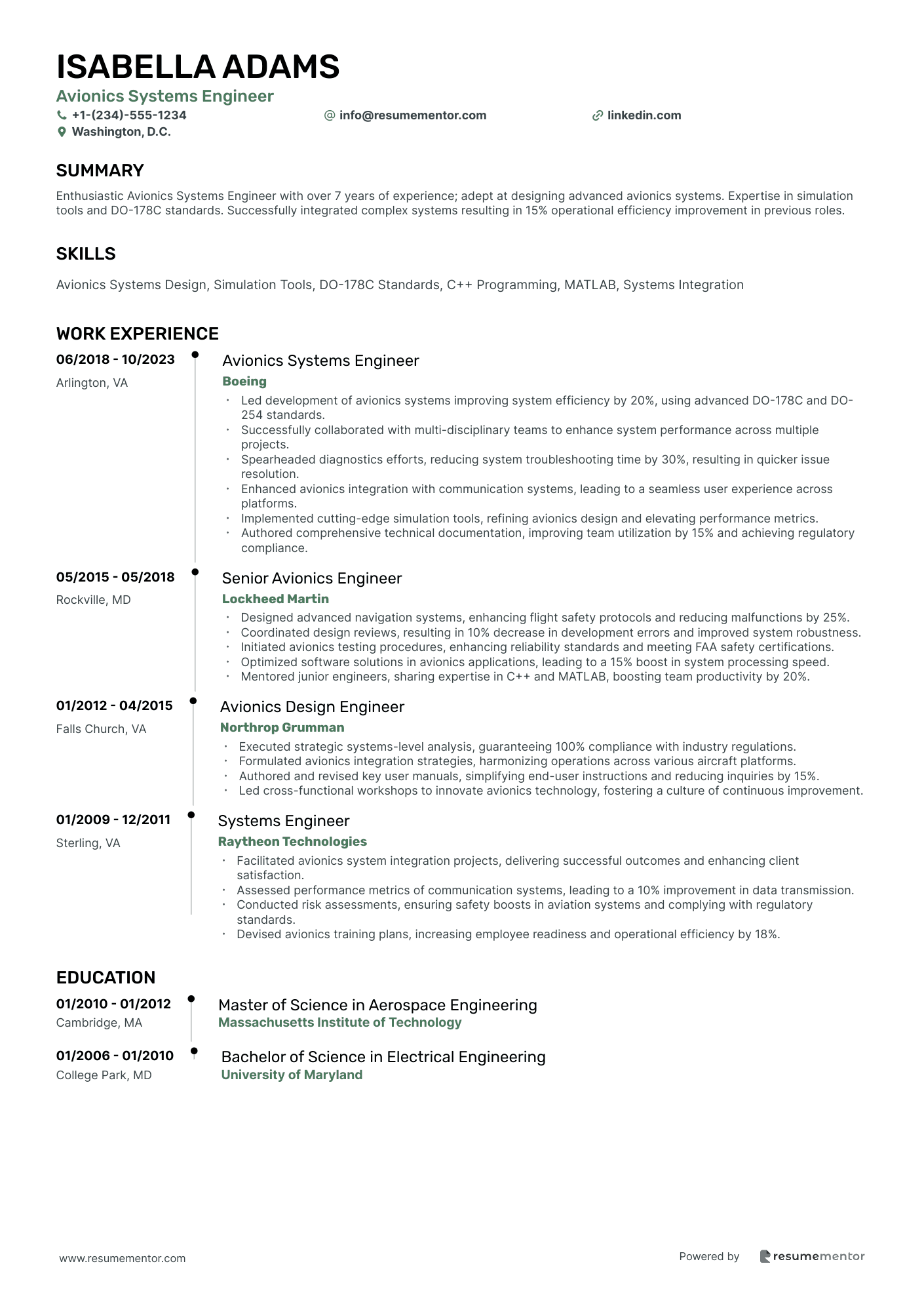
Avionics Systems Engineer
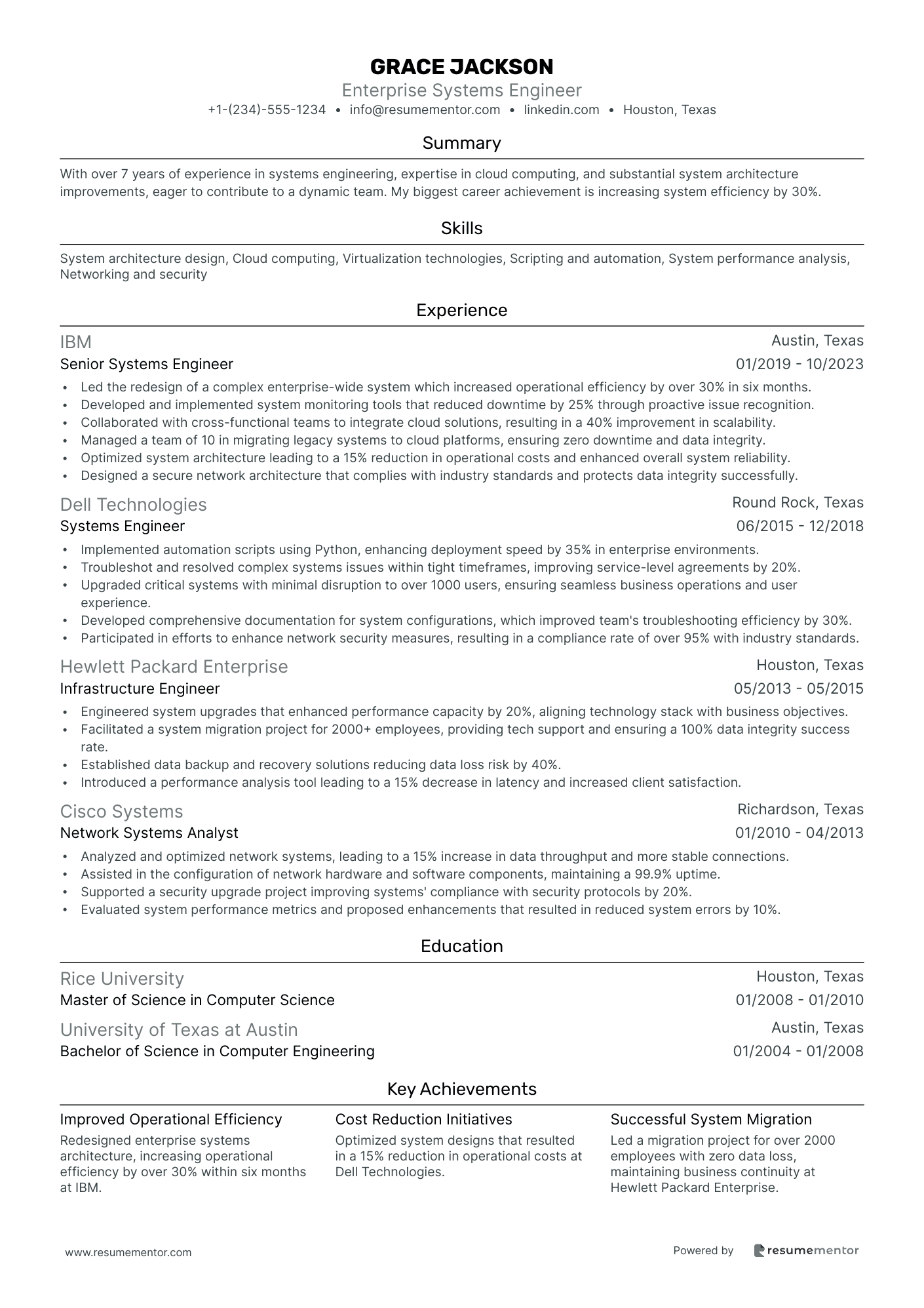
Enterprise Systems Engineer
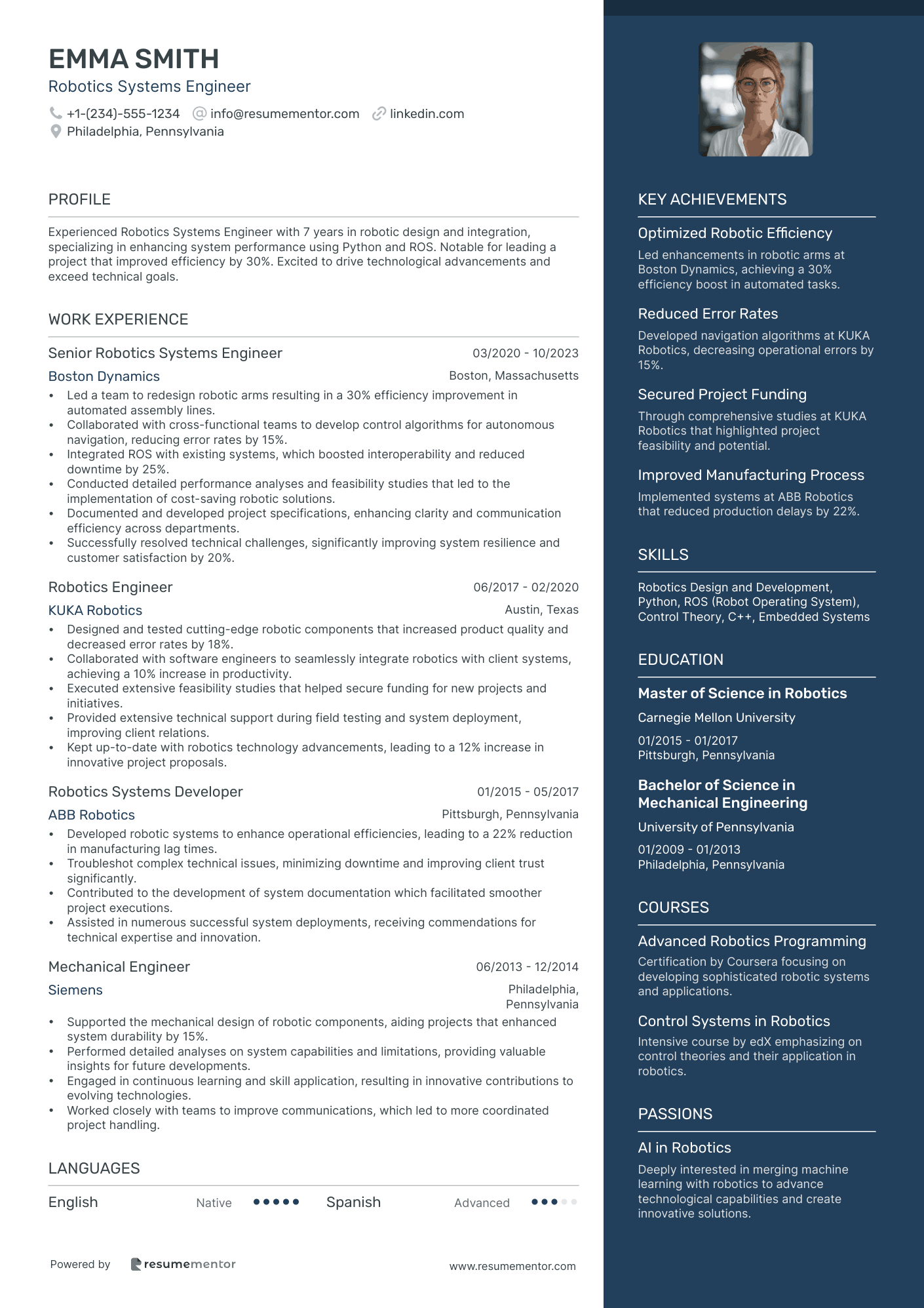
Robotics Systems Engineer
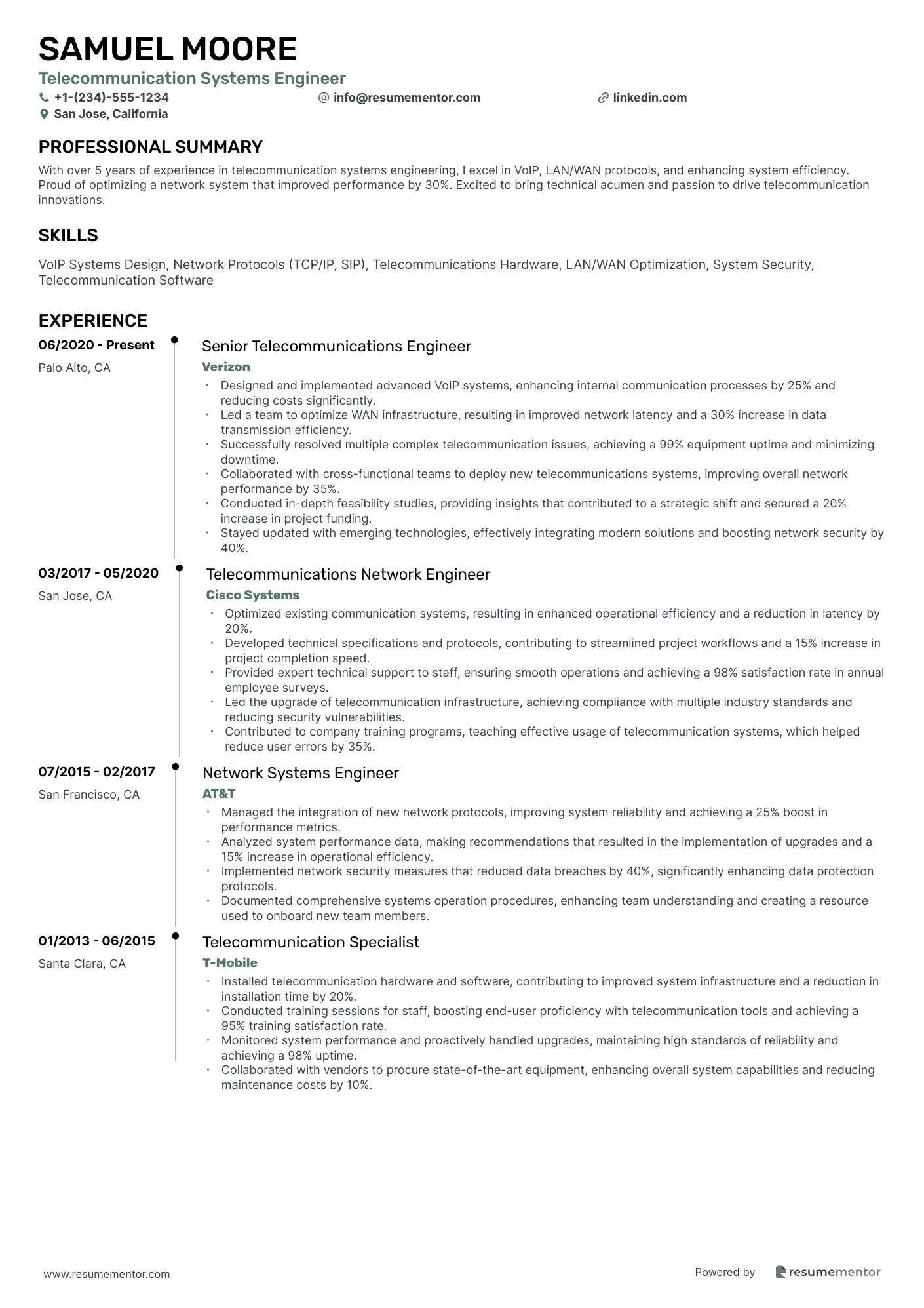
Telecommunication Systems Engineer
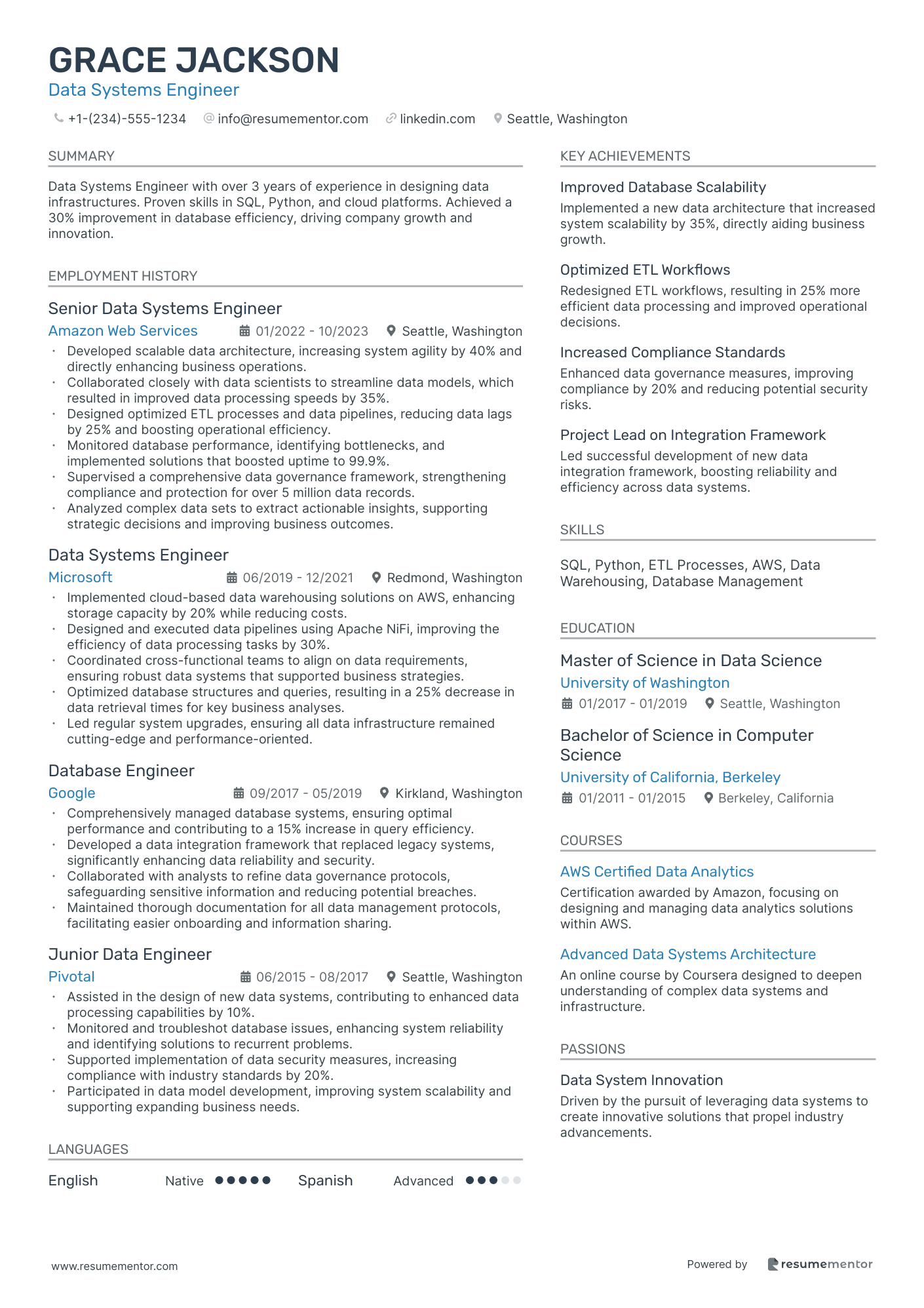
Data Systems Engineer
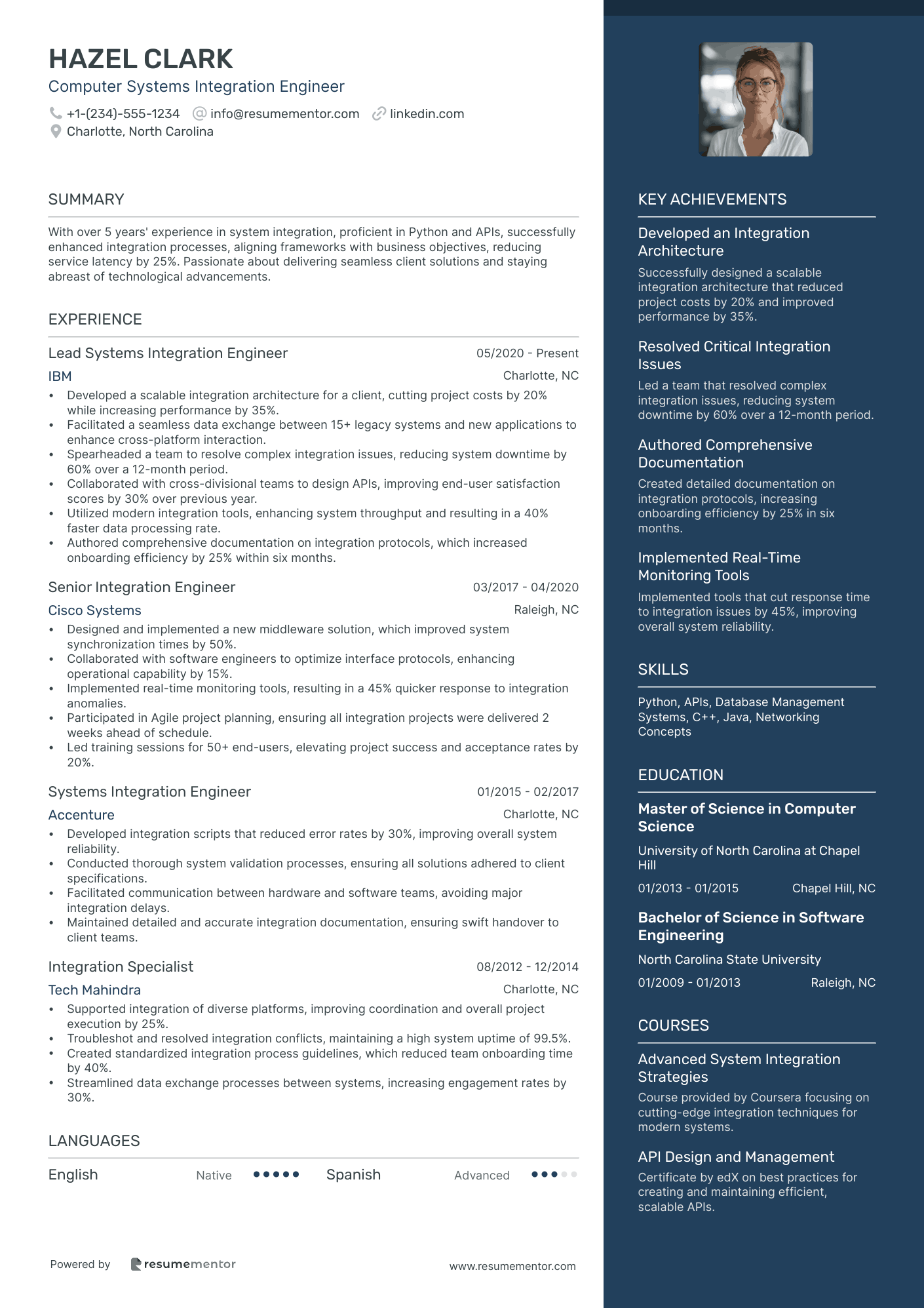
Computer Systems Integration Engineer

Cybersecurity Systems Engineer resume sample
- •Led a comprehensive security architecture redesign which improved incident response times by 35%, resulting in enhanced organizational security.
- •Implemented a new SIEM solution across the enterprise, decreasing false positive alerts by 25% and enhancing threat detection accuracy.
- •Conducted vulnerability assessments and automated patch management that reduced vulnerabilities by 40% in 6 months.
- •Developed and maintained advanced security policies and procedures that improved compliance with ISO 27001 certifications.
- •Conducted regular penetration testing exercises to discover potential risks, reducing data breach risks by 20% annually.
- •Collaborated with IT teams to configure and secure over 500 network endpoints, ensuring sustainable cybersecurity protocols.
- •Coordinated incident response strategies that led to a 50% reduction in security incidents over two years.
- •Evaluated new cybersecurity technologies and led the integration of an IDS solution, improving threat visibility by 30%.
- •Provided guidance on security configurations for enterprise software deployment, resulting in minimized unauthorized access attempts.
- •Prepared and rolled out disaster recovery plans, ensuring continuous operations for mission-critical applications.
- •Led cybersecurity training sessions for 200+ employees, fostering a security-first culture within the organization.
- •Designed secure network systems for enterprise clients, increasing network uptime and security efficiency by 15%.
- •Implemented enterprise-level VPN solutions that supported remote work for over 1000 employees, without incident.
- •Conducted regular security audits that helped maintain compliance with industry-standard cybersecurity practices.
- •Managed cloud security initiatives, leading to a successful migration of critical systems to AWS with zero security incidents.
- •Monitored and responded to security incidents, consistently minimizing potential losses by implementing adaptive security measures.
- •Evaluated security tools for integration, reducing overall costs by selecting solutions that increased efficiency by 20%.
- •Developed initial security protocols and governance that laid the foundation for the company’s robust cybersecurity framework.
- •Played a key role in incident response planning, decreasing downtime during security events by 50%.
Avionics Systems Engineer resume sample
- •Led development of avionics systems improving system efficiency by 20%, using advanced DO-178C and DO-254 standards.
- •Successfully collaborated with multi-disciplinary teams to enhance system performance across multiple projects.
- •Spearheaded diagnostics efforts, reducing system troubleshooting time by 30%, resulting in quicker issue resolution.
- •Enhanced avionics integration with communication systems, leading to a seamless user experience across platforms.
- •Implemented cutting-edge simulation tools, refining avionics design and elevating performance metrics.
- •Authored comprehensive technical documentation, improving team utilization by 15% and achieving regulatory compliance.
- •Designed advanced navigation systems, enhancing flight safety protocols and reducing malfunctions by 25%.
- •Coordinated design reviews, resulting in 10% decrease in development errors and improved system robustness.
- •Initiated avionics testing procedures, enhancing reliability standards and meeting FAA safety certifications.
- •Optimized software solutions in avionics applications, leading to a 15% boost in system processing speed.
- •Mentored junior engineers, sharing expertise in C++ and MATLAB, boosting team productivity by 20%.
- •Executed strategic systems-level analysis, guaranteeing 100% compliance with industry regulations.
- •Formulated avionics integration strategies, harmonizing operations across various aircraft platforms.
- •Authored and revised key user manuals, simplifying end-user instructions and reducing inquiries by 15%.
- •Led cross-functional workshops to innovate avionics technology, fostering a culture of continuous improvement.
- •Facilitated avionics system integration projects, delivering successful outcomes and enhancing client satisfaction.
- •Assessed performance metrics of communication systems, leading to a 10% improvement in data transmission.
- •Conducted risk assessments, ensuring safety boosts in aviation systems and complying with regulatory standards.
- •Devised avionics training plans, increasing employee readiness and operational efficiency by 18%.
Enterprise Systems Engineer resume sample
- •Led the redesign of a complex enterprise-wide system which increased operational efficiency by over 30% in six months.
- •Developed and implemented system monitoring tools that reduced downtime by 25% through proactive issue recognition.
- •Collaborated with cross-functional teams to integrate cloud solutions, resulting in a 40% improvement in scalability.
- •Managed a team of 10 in migrating legacy systems to cloud platforms, ensuring zero downtime and data integrity.
- •Optimized system architecture leading to a 15% reduction in operational costs and enhanced overall system reliability.
- •Designed a secure network architecture that complies with industry standards and protects data integrity successfully.
- •Implemented automation scripts using Python, enhancing deployment speed by 35% in enterprise environments.
- •Troubleshot and resolved complex systems issues within tight timeframes, improving service-level agreements by 20%.
- •Upgraded critical systems with minimal disruption to over 1000 users, ensuring seamless business operations and user experience.
- •Developed comprehensive documentation for system configurations, which improved team's troubleshooting efficiency by 30%.
- •Participated in efforts to enhance network security measures, resulting in a compliance rate of over 95% with industry standards.
- •Engineered system upgrades that enhanced performance capacity by 20%, aligning technology stack with business objectives.
- •Facilitated a system migration project for 2000+ employees, providing tech support and ensuring a 100% data integrity success rate.
- •Established data backup and recovery solutions reducing data loss risk by 40%.
- •Introduced a performance analysis tool leading to a 15% decrease in latency and increased client satisfaction.
- •Analyzed and optimized network systems, leading to a 15% increase in data throughput and more stable connections.
- •Assisted in the configuration of network hardware and software components, maintaining a 99.9% uptime.
- •Supported a security upgrade project improving systems' compliance with security protocols by 20%.
- •Evaluated system performance metrics and proposed enhancements that resulted in reduced system errors by 10%.
Robotics Systems Engineer resume sample
- •Led a team to redesign robotic arms resulting in a 30% efficiency improvement in automated assembly lines.
- •Collaborated with cross-functional teams to develop control algorithms for autonomous navigation, reducing error rates by 15%.
- •Integrated ROS with existing systems, which boosted interoperability and reduced downtime by 25%.
- •Conducted detailed performance analyses and feasibility studies that led to the implementation of cost-saving robotic solutions.
- •Documented and developed project specifications, enhancing clarity and communication efficiency across departments.
- •Successfully resolved technical challenges, significantly improving system resilience and customer satisfaction by 20%.
- •Designed and tested cutting-edge robotic components that increased product quality and decreased error rates by 18%.
- •Collaborated with software engineers to seamlessly integrate robotics with client systems, achieving a 10% increase in productivity.
- •Executed extensive feasibility studies that helped secure funding for new projects and initiatives.
- •Provided extensive technical support during field testing and system deployment, improving client relations.
- •Kept up-to-date with robotics technology advancements, leading to a 12% increase in innovative project proposals.
- •Developed robotic systems to enhance operational efficiencies, leading to a 22% reduction in manufacturing lag times.
- •Troubleshot complex technical issues, minimizing downtime and improving client trust significantly.
- •Contributed to the development of system documentation which facilitated smoother project executions.
- •Assisted in numerous successful system deployments, receiving commendations for technical expertise and innovation.
- •Supported the mechanical design of robotic components, aiding projects that enhanced system durability by 15%.
- •Performed detailed analyses on system capabilities and limitations, providing valuable insights for future developments.
- •Engaged in continuous learning and skill application, resulting in innovative contributions to evolving technologies.
- •Worked closely with teams to improve communications, which led to more coordinated project handling.
Telecommunication Systems Engineer resume sample
- •Designed and implemented advanced VoIP systems, enhancing internal communication processes by 25% and reducing costs significantly.
- •Led a team to optimize WAN infrastructure, resulting in improved network latency and a 30% increase in data transmission efficiency.
- •Successfully resolved multiple complex telecommunication issues, achieving a 99% equipment uptime and minimizing downtime.
- •Collaborated with cross-functional teams to deploy new telecommunications systems, improving overall network performance by 35%.
- •Conducted in-depth feasibility studies, providing insights that contributed to a strategic shift and secured a 20% increase in project funding.
- •Stayed updated with emerging technologies, effectively integrating modern solutions and boosting network security by 40%.
- •Optimized existing communication systems, resulting in enhanced operational efficiency and a reduction in latency by 20%.
- •Developed technical specifications and protocols, contributing to streamlined project workflows and a 15% increase in project completion speed.
- •Provided expert technical support to staff, ensuring smooth operations and achieving a 98% satisfaction rate in annual employee surveys.
- •Led the upgrade of telecommunication infrastructure, achieving compliance with multiple industry standards and reducing security vulnerabilities.
- •Contributed to company training programs, teaching effective usage of telecommunication systems, which helped reduce user errors by 35%.
- •Managed the integration of new network protocols, improving system reliability and achieving a 25% boost in performance metrics.
- •Analyzed system performance data, making recommendations that resulted in the implementation of upgrades and a 15% increase in operational efficiency.
- •Implemented network security measures that reduced data breaches by 40%, significantly enhancing data protection protocols.
- •Documented comprehensive systems operation procedures, enhancing team understanding and creating a resource used to onboard new team members.
- •Installed telecommunication hardware and software, contributing to improved system infrastructure and a reduction in installation time by 20%.
- •Conducted training sessions for staff, boosting end-user proficiency with telecommunication tools and achieving a 95% training satisfaction rate.
- •Monitored system performance and proactively handled upgrades, maintaining high standards of reliability and achieving a 98% uptime.
- •Collaborated with vendors to procure state-of-the-art equipment, enhancing overall system capabilities and reducing maintenance costs by 10%.
Data Systems Engineer resume sample
- •Developed scalable data architecture, increasing system agility by 40% and directly enhancing business operations.
- •Collaborated closely with data scientists to streamline data models, which resulted in improved data processing speeds by 35%.
- •Designed optimized ETL processes and data pipelines, reducing data lags by 25% and boosting operational efficiency.
- •Monitored database performance, identifying bottlenecks, and implemented solutions that boosted uptime to 99.9%.
- •Supervised a comprehensive data governance framework, strengthening compliance and protection for over 5 million data records.
- •Analyzed complex data sets to extract actionable insights, supporting strategic decisions and improving business outcomes.
- •Implemented cloud-based data warehousing solutions on AWS, enhancing storage capacity by 20% while reducing costs.
- •Designed and executed data pipelines using Apache NiFi, improving the efficiency of data processing tasks by 30%.
- •Coordinated cross-functional teams to align on data requirements, ensuring robust data systems that supported business strategies.
- •Optimized database structures and queries, resulting in a 25% decrease in data retrieval times for key business analyses.
- •Led regular system upgrades, ensuring all data infrastructure remained cutting-edge and performance-oriented.
- •Comprehensively managed database systems, ensuring optimal performance and contributing to a 15% increase in query efficiency.
- •Developed a data integration framework that replaced legacy systems, significantly enhancing data reliability and security.
- •Collaborated with analysts to refine data governance protocols, safeguarding sensitive information and reducing potential breaches.
- •Maintained thorough documentation for all data management protocols, facilitating easier onboarding and information sharing.
- •Assisted in the design of new data systems, contributing to enhanced data processing capabilities by 10%.
- •Monitored and troubleshot database issues, enhancing system reliability and identifying solutions to recurrent problems.
- •Supported implementation of data security measures, increasing compliance with industry standards by 20%.
- •Participated in data model development, improving system scalability and supporting expanding business needs.
Computer Systems Integration Engineer resume sample
- •Developed a scalable integration architecture for a client, cutting project costs by 20% while increasing performance by 35%.
- •Facilitated a seamless data exchange between 15+ legacy systems and new applications to enhance cross-platform interaction.
- •Spearheaded a team to resolve complex integration issues, reducing system downtime by 60% over a 12-month period.
- •Collaborated with cross-divisional teams to design APIs, improving end-user satisfaction scores by 30% over previous year.
- •Utilized modern integration tools, enhancing system throughput and resulting in a 40% faster data processing rate.
- •Authored comprehensive documentation on integration protocols, which increased onboarding efficiency by 25% within six months.
- •Designed and implemented a new middleware solution, which improved system synchronization times by 50%.
- •Collaborated with software engineers to optimize interface protocols, enhancing operational capability by 15%.
- •Implemented real-time monitoring tools, resulting in a 45% quicker response to integration anomalies.
- •Participated in Agile project planning, ensuring all integration projects were delivered 2 weeks ahead of schedule.
- •Led training sessions for 50+ end-users, elevating project success and acceptance rates by 20%.
- •Developed integration scripts that reduced error rates by 30%, improving overall system reliability.
- •Conducted thorough system validation processes, ensuring all solutions adhered to client specifications.
- •Facilitated communication between hardware and software teams, avoiding major integration delays.
- •Maintained detailed and accurate integration documentation, ensuring swift handover to client teams.
- •Supported integration of diverse platforms, improving coordination and overall project execution by 25%.
- •Troubleshot and resolved integration conflicts, maintaining a high system uptime of 99.5%.
- •Created standardized integration process guidelines, which reduced team onboarding time by 40%.
- •Streamlined data exchange processes between systems, increasing engagement rates by 30%.
Crafting a resume as a systems engineer is like assembling a finely tuned machine; each piece needs to connect seamlessly. In today's job market, this document often serves as your first interaction with potential employers, making it essential to highlight your engineering expertise with clarity and precision. Yet, translating your skills and achievements into a compelling story can be a daunting task.
This is where resume templates become invaluable. They offer a structured framework that helps you organize your experience and skills, ensuring nothing gets overlooked. With a resume template, you're better equipped to present key areas like technical skills, software proficiency, and project outcomes in a cohesive manner.
Achieving the right balance between technical language and readability is critical. Your objective is to make your expertise accessible to both hiring managers and those without a technical background, crafting a narrative of problem-solving and value-add in your roles.
Choosing which details to include can also be complex. Your resume needs to tell the unique story of your career while remaining succinct. This guide is here to help you weave your experiences into a standout resume that truly reflects your strengths as a systems engineer. Let’s work on making your resume as precise and efficient as the systems you engineer.
Key Takeaways
- A systems engineer resume should highlight expertise in managing complex systems, emphasizing technical skills and making the information accessible to both technical and non-technical audiences.
- Using resume templates can help create a structured format, ensuring that all important details like technical skills, project outcomes, and professional experience are cohesively presented.
- Choosing the right resume format, such as chronological, is crucial for showcasing career progression, while maintaining readability with appropriate fonts and file formats like PDF.
- The experience section should quantify achievements and align with job requirements, using strong action words to effectively convey impact and demonstrate skills like problem-solving and leadership.
- Including certificates in a resume is important for showcasing specific skills and knowledge, and extra sections like languages, hobbies, and volunteer work can provide a more rounded view of your qualifications and personal traits.
What to focus on when writing your systems engineer resume
A systems engineer resume should convey your expertise in managing and optimizing complex systems, making it clear to recruiters that you're equipped to handle advanced technical challenges. It must highlight your ability to design, implement, and maintain systems that meet organizational requirements, showcase your proficiency with relevant technologies, and demonstrate your capacity for effective system integrations.
How to structure your systems engineer resume
- Contact Information: Your resume should start with your full name, phone number, email address, and LinkedIn profile, ensuring recruiters can easily contact you. This basic yet crucial information sets the stage for your professional narrative, laying a foundation for your skills and experience.
- Professional Summary: This section should offer a concise yet impactful overview of your major skills, experience, and what makes you a standout candidate. It’s a snapshot of your professional persona, designed to grab attention and make recruiters want to learn more about your capabilities.
- Technical Skills: Highlight the specific tools, programming languages, and systems you excel in, such as Linux, Windows Server, or AWS. By listing these, you provide a direct link to the technologies that enable you to solve problems and address organizational needs.
- Professional Experience: Detail your past roles by focusing on achievements and responsibilities that are directly related to system design, integration, and support. This section connects your technical skills with real-world applications, proving your ability to perform in a professional setting.
- Education: Include your degree(s), institution(s), and graduation date(s), along with certifications like CCNA or AWS Certified Solutions Architect. These credentials add credibility and context to your technical skills and professional background.
- Projects: Describe key projects you've worked on, specifying your role and the technologies involved. This helps recruiters see the practical application of your skills and your potential for future contributions.
Next, we'll delve deeper into each section, ensuring your resume is tailored to make a lasting impact.
Which resume format to choose
In the competitive world of systems engineering, crafting a standout resume is essential to catch the eye of potential employers. Selecting the right format, especially the chronological format, is key for highlighting your experience and career progression. This format is particularly effective as it tells a clear story of your journey in the field, showcasing your technical skills and professional growth.
Your choice of font also plays a role in making your resume visually appealing while maintaining professionalism. Opt for a modern look that balances style and readability. Rubik, Montserrat, and Raleway are excellent choices for this balance. They keep your resume looking fresh and current, which can subtly communicate that you are up-to-date with industry trends and technologies, a key trait in systems engineering.
Ensuring your resume is saved as a PDF is crucial. This helps maintain the layout and design consistently across different platforms and devices, ensuring your resume appears just as you intended every time it’s viewed. In a job market where first impressions count, a well-formatted PDF ensures nothing is left to chance.
Lastly, paying attention to the margins is important for the overall readability of your resume. Keeping them at 1 inch all around provides ample white space, avoiding a cluttered look and allowing easy navigation through your experience and skills. This clean and organized presentation can make a big difference in how your qualifications are perceived, emphasizing the clear presentation and logical structuring that are valued skills in a systems engineer. Bringing these elements together effectively showcases your abilities and helps you stand out in the field of systems engineering.
How to write a quantifiable resume experience section
In your resume's experience section, focus on showcasing how your systems engineering skills have produced tangible results. This section should clearly outline your ability to drive positive outcomes, so list your roles in reverse chronological order to highlight your recent contributions. Aim to capture experiences from the past 10-15 years, emphasizing those that align with the job you’re applying for. Tailoring your resume is crucial; align your skills and achievements with the job ad’s requirements. Employ strong action words like "developed," "optimized," and "implemented" to effectively convey your impact.
Consider this example:
- •Led a team of 5 in migrating 200+ servers, cutting downtime by 30%.
- •Implemented a monitoring system that lowered system failures by 40% and boosted uptime.
- •Streamlined deployment processes, trimming deployment time by 25% for faster rollouts.
- •Worked with cross-functional teams to enhance system security, slicing vulnerabilities by 50%.
The above experience section captures your impact by detailing specific achievements with clear results. By using strong action-oriented language, it integrates your technical prowess with demonstrated leadership and teamwork skills. Each bullet point naturally ties into a broader narrative about improving systems and efficiency. This cohesive presentation clarifies how your skills and track record meet employers' needs, helping them readily see the value you bring to their team.
Growth-Focused resume experience section
A growth-focused systems engineer resume experience section should effectively highlight your ability to propel company growth through strategic system enhancements. Begin by spotlighting roles where you made substantial contributions to expanding or improving systems, software, or processes. Use strong action verbs to vividly describe how your efforts increased efficiency, drove revenue growth, or assisted in company expansion. Amplify the impact of your achievements by including quantifiable results, such as percentage increases in system efficiency or reductions in downtime.
Delve deeper into the description by focusing on the unique value you added to the company's growth initiatives. Mention any leadership roles you assumed, innovative solutions you developed, or collaborative projects that fostered positive organizational changes. Use straightforward language and avoid technical jargon, ensuring your message resonates with a broad audience. Capture the attention of potential employers by demonstrating how your proactive approach and strategic thinking were instrumental in driving growth and development. Here’s an example formatted in JSON:
Systems Engineer
Tech Innovators Inc.
January 2020 - Present
- Increased server efficiency by 30% through strategic upgrades and optimization.
- Led a cross-functional team in developing an automated monitoring system that reduced downtime by 40%.
- Implemented scalable solutions that supported a revenue growth of 15% over one year.
- Collaborated closely with the sales department to align system infrastructure with market expansion goals.
Technology-Focused resume experience section
A systems engineer technology-focused resume experience section should clearly highlight your technical expertise and the impact of your efforts on various projects or within your organization. Begin by specifying roles where your skills directly led to successful outcomes. Use action-oriented language and, when possible, quantify your achievements to illustrate the tangible benefits of your work. This approach not only emphasizes your proficiency with specific technologies and methodologies but also showcases any leadership roles that underscore your comprehensive skill set.
Each bullet point should seamlessly convey your responsibilities and their significance, avoiding unnecessary jargon to maintain clarity. Concentrate on your accomplishments and the problems you solved, illustrating your ability to handle challenges effectively. By integrating these details, you present yourself as a proactive and accomplished systems engineer who consistently delivers results.
Senior Systems Engineer
Tech Innovators Inc.
June 2019 - Present
- Led a team of 5 to migrate legacy systems to cloud solutions, boosting scalability by 30%.
- Enhanced network performance with new protocols, reducing downtime by 20%.
- Created automation scripts, cutting deployment time by 40% and improving efficiency.
- Partnered with cross-functional teams to implement security measures, strengthening data protection and compliance.
Achievement-Focused resume experience section
A systems engineer achievement-focused resume experience section should effectively showcase how your contributions led to significant improvements. Begin by highlighting the concrete results of your work and weave in details about the context and steps you took. Using numbers adds weight to your achievements and helps paint a clearer picture. Your bullet points should seamlessly narrate the story of your impact on team and project goals.
Think of this section as a cohesive narrative where you are the protagonist solving technical challenges. It’s essential to highlight your technical skills alongside your problem-solving abilities, teamwork, and leadership qualities. Every bullet point should demonstrate your initiative and tangible contributions. Express how your efforts led to process improvements or met company objectives, reflecting a proactive approach that consistently drives progress.
Systems Engineer
Tech Innovators Inc
June 2020 - Present
- Led a team of engineers to design and implement a new automation framework, cutting testing time by 40%.
- Developed and documented system architecture for new software features, boosting system performance by 25%.
- Collaborated with cross-functional teams to integrate new technologies, leading to a 30% increase in efficiency.
- Trained junior engineers, bolstering team capabilities and reducing onboarding time by 20%.
Skills-Focused resume experience section
A skills-focused systems engineer resume experience section should highlight the specific abilities and achievements that have shaped your professional journey. Begin by identifying the skills and accomplishments from each role that are most relevant to the job you're targeting. Emphasize how you leveraged these skills to drive successful outcomes, ensuring your contributions are both impactful and pertinent. Writing with active and descriptive language helps demonstrate your direct involvement in achieving positive results.
Organize each entry by listing the dates, your job title, and the name of the company, followed by bullet points that detail your achievements. Make your accomplishments clearer by using quantifiable metrics, which can vividly illustrate the scope and impact of your work for potential employers. By defining results clearly, you provide evidence of your expertise, making your claims more compelling. Keep your descriptions concise and focus on the standout skills that underscore your ability as a top-tier systems engineer.
Systems Engineer
Tech Innovations Inc.
2019 - 2023
- Led the design and implementation of a scalable network infrastructure, boosting data retrieval efficiency by 30%.
- Created automation scripts to streamline server configurations, cutting setup time by half.
- Worked with cross-functional teams to integrate new technologies, improving system performance by 20%.
- Managed a critical security upgrade project, strengthening network defenses and reducing vulnerabilities.
Write your systems engineer resume summary section
A systems engineer-focused resume summary should be crafted to quickly grab the attention of potential employers and bring your strongest qualities to the forefront. This brief statement is your opportunity to highlight the skills, experience, and accomplishments that define you in the tech space. For a systems engineer, effectively conveying your technical expertise and professional background is crucial. Here's an example:
In this example, your deep experience and achievements are succinctly outlined, with an emphasis on your technical skills and collaborative work style. The summary showcases your ability to work well in teams and underscores your expertise in essential technologies like cloud computing and cybersecurity, which are vital for a systems engineer.
If you are just beginning your career, an objective statement can better express your goals and how you plan to contribute positively to a company. While a summary highlights your past accomplishments, an objective focuses on your aspirations and potential value to employers. Resume profiles offer another avenue, providing a tailored snapshot of your qualifications for each application.
Differently, a summary of qualifications lists your skills and accomplishments in bullet points, offering a more detailed view than a summary. Tailoring your resume section based on your level of experience ensures that you present your best self, whether you're starting out or are an experienced professional.
Listing your systems engineer skills on your resume
A skills-focused systems engineer resume should vividly showcase your abilities to potential employers. Whether you list skills as a standalone section or weave them into your experience and summary, emphasizing your strengths is crucial. A standalone section provides a clear spotlight on strengths, like soft skills such as communication and teamwork. Meanwhile, your hard skills, such as Linux proficiency or network design, reveal your technical acumen.
Highlighting your skills and strengths serves as effective resume keywords. These keywords ensure your resume catches the eye of recruiters looking for specific qualifications.
For a systems engineer, emphasizing relevant skills is key. Including both technical proficiencies and soft skills on your resume shows recruiters you're a well-rounded candidate for the role.
For instance, consider the following example of how you might present your skills:
The list above effectively captures the essential abilities needed for a systems engineer. It's clear, relevant, and demonstrates the breadth of your technical expertise directly related to day-to-day systems engineering tasks.
Best hard skills to feature on your systems engineer resume
Hard skills are the technical backbone of your resume, demonstrating your ability to manage core job functions. They are the skills that set you apart and communicate your technical expertise effectively.
Hard Skills
- Network Design
- System Integration
- Linux Administration
- Cloud Computing
- Cybersecurity
- Automation Scripting
- Data Analysis
- Virtualization
- DevOps
- Infrastructure Management
- Systems Architecture
- Database Management
- Performance Tuning
- Quality Assurance
- Troubleshooting and Diagnostics
Best soft skills to feature on your systems engineer resume
Soft skills, on the other hand, complement your technical prowess by showcasing how well you interact and work with others. They indicate your ability to thrive in team settings and adapt to changing environments.
Soft Skills
- Communication
- Problem Solving
- Teamwork
- Adaptability
- Critical Thinking
- Time Management
- Leadership
- Creativity
- Decision Making
- Conflict Resolution
- Attention to Detail
- Collaboration
- Emotional Intelligence
- Initiative
- Stress Management
How to include your education on your resume
The education section is a vital part of your systems engineer resume. This section shows employers your academic background and how it relates to the job you're applying for. Tailor this section carefully; omit courses or degrees irrelevant to systems engineering to maintain focus. If your GPA is above a 3.0, include it to highlight your academic success. Display honors such as cum laude by placing it next to your degree to demonstrate excellence. List your degree with the major first followed by the institution’s name and dates of attendance.
Here’s an incorrect example of an education section:
Here’s a correct example aligned with a systems engineer role:
This second example is strong because it highlights a relevant degree in computer engineering. It emphasizes academic excellence with a high GPA and cum laude distinction. The absence of unnecessary details ensures the focus remains on your qualifications relevant to systems engineering. It presents clearly how your education supports your ability to perform effectively in the target role.
How to include systems engineer certificates on your resume
Including a certificates section is crucial for a systems engineer resume. It demonstrates your specific skills and knowledge that align with the job. Place the certificates section prominently to ensure it catches the hiring manager's eye. Some candidates add certificates in the header, next to their contact info for instant visibility.
List the name of the certificate clearly. Include the date you received it to show its relevance. Add the issuing organization to establish credibility. Follow these steps to create a comprehensive and professional certificates section.
This example stands out due to its relevance and clear presentation. It includes widely recognized certifications for a systems engineer. The names, dates, and reputable issuing organizations are all present, making it easy for hiring managers to quickly verify qualifications. This approach shows your dedication to staying current in your field. It effectively demonstrates your skillset and enhances your resume.
Extra sections to include in your systems engineer resume
It's crucial to build a well-rounded resume when applying for a systems engineer position. This article will guide you on how to include key sections such as languages, hobbies and interests, volunteer work, and books into your resume. Properly incorporating these sections can help you stand out from other candidates.
Language section—Demonstrates proficiency in multiple languages, showcasing your ability to work in diverse environments and with international teams. Include languages like Python, Java, and Spanish, indicating your technical and communication skills.
Hobbies and interests section—Shows your personality and can reflect qualities like teamwork, creativity, or leadership. Include hobbies like coding competitions, robotics clubs, or mountain biking, emphasizing a balanced and active lifestyle.
Volunteer work section—Highlights your commitment to the community and teamwork, which are valuable in a collaborative engineering setting. Include experiences like mentoring at a local coding boot camp or participating in engineering outreach programs.
Books section—Indicates your dedication to continuous learning and keeping up with industry trends. Mention titles like "Designing Data-Intensive Applications" or "Clean Code" to showcase your proactive approach to professional development.
In Conclusion
In conclusion, crafting a standout resume as a systems engineer is essential to land your dream job. Your resume should be as finely tuned as the systems you engineer, ensuring all elements connect seamlessly to tell the story of your career. By using resume templates, you can structure your experiences and skills effectively, making sure nothing important is overlooked. Your resume serves as a snapshot of your professional journey, highlighting your technical skills alongside your ability to solve complex problems. Choosing the right format, like a chronological one, helps narrate your career growth clearly, showcasing your most recent achievements. An effective resume balances technical proficiency with readability, conveying your credentials to both technical and non-technical recruiters. Furthermore, tailor each section meticulously to reflect your skills and accomplishments related to the specific job description you’re targeting. Highlight your credentials through succinct examples and quantifiable results, which speak volumes about your impact in previous roles. Additionally, emphasize your educational background, certifications, and any extra sections to give a holistic view of who you are as a professional. By combining these elements, your resume not only reflects your abilities but also positions you as a highly capable candidate ready to tackle the advanced challenges of systems engineering.
Related Articles

Continue Reading
Check more recommended readings to get the job of your dreams.
Resume
Resources
Tools
© 2026. All rights reserved.
Made with love by people who care.

